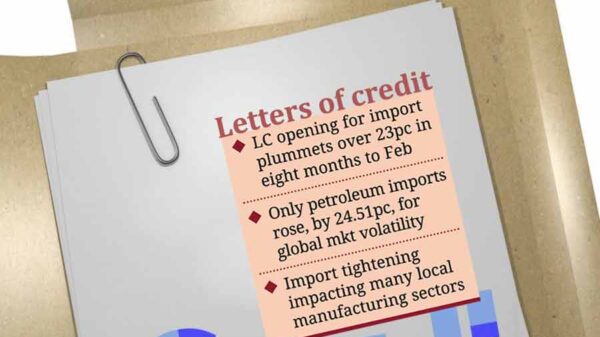
LC tightening enforced in the wake of dollar crunch squeezes imports and slows economy that prompts an industry leader to urge the government to relax restrictions.
A noted banker joins his voice with the business leader in calling for import acceleration, as he rues income loss for banks and the government too.
The opening of letters of credit (LCs) for import slummed by over 23 per cent during eight months to February as Bangladesh gets tightfisted to ease pressures on its foreign-exchange reserves.
This is apparently impacting many local manufacturers as the import of raw materials, capital machinery and intermediate goods also slumped.
Many involved with the international trade say the downturn in import has been slowing the economy at large.
But the main export-earning sector of apparel–both oven and knit garments–remained outside the belt-tightening as they import through back-to-back LCs. The share of back-to-back LCs is nearly 13 per cent of the US$45.5 billion worth of LC openings.
During the period under review, the total opening of LCs was recorded at US$45.5 billion, down by 23.53 per cent from the same period a year earlier.
The opening of LCs against intermediate goods dropped by 30.32 per cent during the eight months, capital machinery by 54.11 per cent, industrial raw materials by 30.05 per cent, consumer goods 14.53 per cent, machinery for miscellaneous industry by 43.18 per cent and others by 17 per cent.
Only petroleum imports whose market remained volatile since the beginning of war in Europe rose 24.51 per cent, according to official statistics prepared by Bangladesh Bank (BB), the central bank of Bangladesh.
People familiar with such developments on the trade front told The FE that the tight-fisting has been impacting many local manufacturing sectors, especially who depend on imported raw materials.
“A local mobile-phone assembler came to us for importing some of intermediate goods for manufacturing smart phones, but it did not open LCs following the central bank restrictions imposed during July last,” said Syed Shahriyar Ahsan, Chief Executive Officer (CEO) at Pioneer Insurance, a leading nonlife insurer. Importers need insurance coverage for importing any goods.
As the number of LCs keeps declining, their business is on the downturn too although the company listed with the bourses announced 30-percent dividend to their shareholders for 2022 period, he said.
President of Bangladesh Chamber of Industries (BCI) Anwar-Ul Alam Chowdhury Pervez mentions that many non-RMG industries have been facing problem in opening LCs that has adversely impacted their production.
The government took the belt-tightening measures in the wake of recent volatility in the global macroeconomic situations in order to protect falling forex reserves. “But, I think, the government should lift the import restrictions considering survival of the industries as the economy started rebounding again,” Mr. Chowdhury said.
Managing Director and Chief Executive Officer of Mutual Trust Bank (MTB) Limited Syed Mahbubur Rahman feels that the falling trend in import orders indicates that the economy is slowing down.
It (the fall in imports) has multiple affects on the economy, with declining earnings for the government and the banks as well, he said.
“Of course, it is a matter of concern for banks,” the banker added.